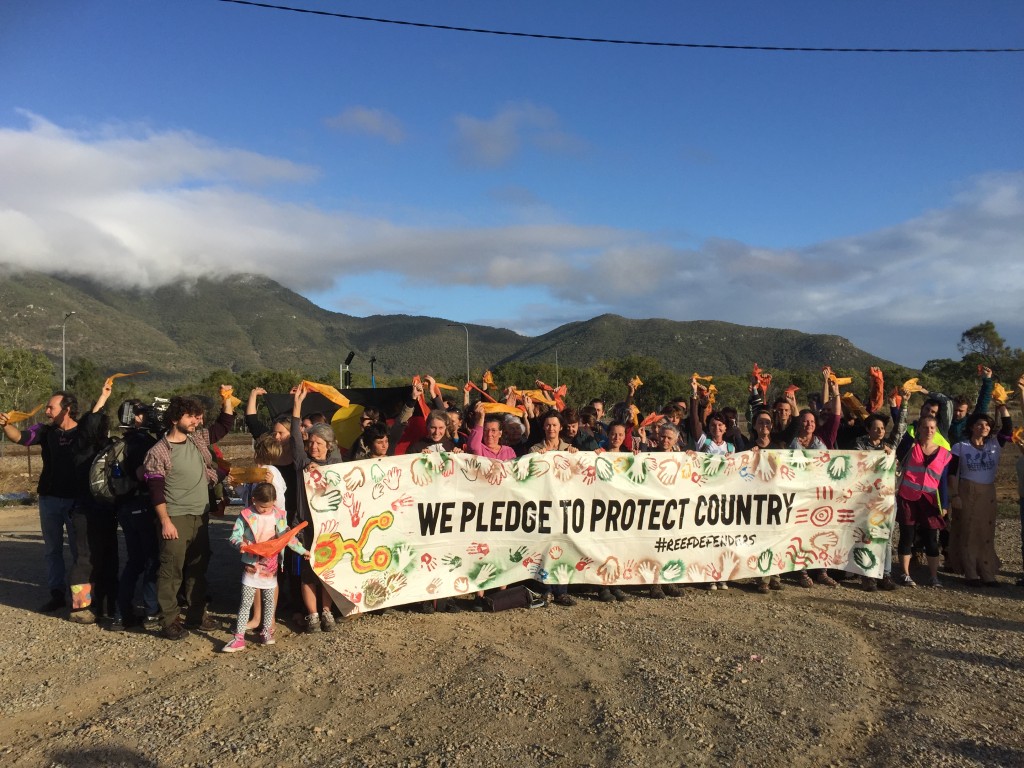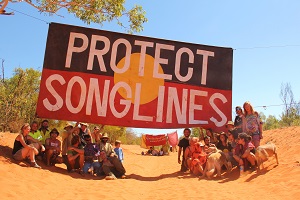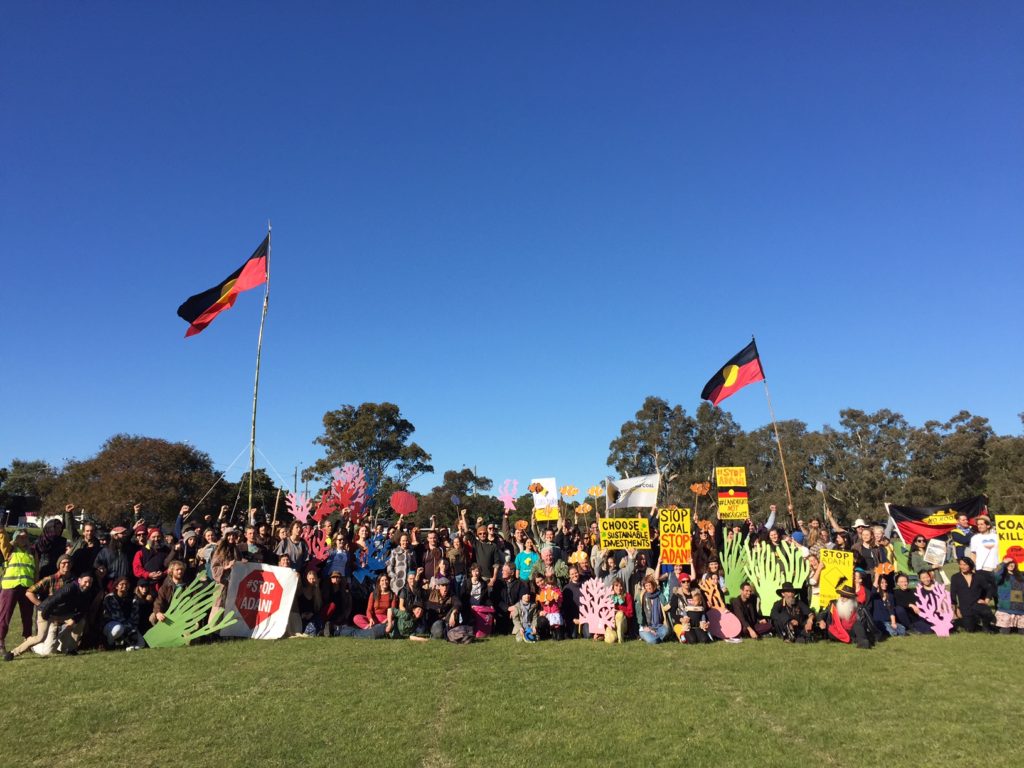Many of you may have seen news about the proposed changes to the Australian Charities and Not-for-profits Commission Act which will severely curtail peaceful protest and limit charities in their advocacy work. Essentially the government wants to add a range of minor summary offences to the “Governance Standard 3” which currently states that a range of serious indictable offences are grounds for de-registration of a charity.
They are the most serious attack on democracy we have seen at CounterAct – and we have been watching and monitoring repressive legislation, policing and other tactics used to silence dissent since our inception.
This is the Liberal parties latest attack on non profits, charities and peaceful resistance. Whilst there has been some great media on this, see the Guardian and an excellent breakdown in the Conversation and much more available at Hands Off Our Charities coalition website – there has been little focus on what this might mean for grassroots and movements for social, racial, and environmental justice in the longer term.

That’s where we come in. We’ve been speaking to activists all over the country to look at case studies for which protests and rallies could have been grounds for deregistration by organisations who had actively promoted, resourced or attended. And its extremely concerning. All the major grassroots movement mobilisations in recent years included aspects that could trigger a de-registration for charities that resourced or promoted them – including the largest rallies in recent history – for Black Lives Matter, shining a light on Deaths in Custody, the Women’s March for Justice events all over the country, School Strike and rallies and vigils highlighting refugee rights.
Even the massive “Peoples Climate March” some five years ago – with 350 organisations supporting it, could have technically been liable for deregistration for 100’s of groups for the Melbourne event.
This means critical support for peaceful protests could be significantly limited in future, with charities steering clear of events that would have seemed quite mainstream up until now.
Many charities have been speaking to some of the major concerns in the media – this includes a massive administrative burden on small groups (55,000+) who need to develop “internal control procedures” which will somehow be expected to risk manage any involvement with volunteer organisers or collaborative organisations – to ensure that their organisation doesn’t inadvertently provide resources, or active promotion of events that could involve an element of trespass or other minor summary offences. As one example this could likely mean an end to snap rallies being supported by charities as they will not be able to ensure there is a permit/notice of assembly sorted. Currently organisations tend to negotiate successfully with police when these events occur, but the police will no longer be the arbiter of what is lawful and in the community interest.
There are significant issues of over-reach in the power given to the Commissioner Gary Johns (infamous for his racism and disregard of the charities he is paid to support), in that he can make a sole determination about what constitutes an offence – without evidence from police, and also an extraordinary aspect, that states that a charity can be deregistered for something they haven’t even done yet. There is more in this excellent explainer from the good folks at Human Rights Law Centre.
The Hands off Our Charities Alliance has done some great work highlighting some of these issues in mainstream media, including a recent snag in the government’s united front, including a Liberal Senator raising concerns, as well as calling for the United Nations to get involved.
Aboriginal organisations have come out with a range of concerns – concerned that their ability to advocate will be impacted – especially after seeing such huge momentum in recent years on issues of racial justice.
Also here is an excellent article from Tim Costello “It is difficult to see this as anything other than a concerted effort by the government to stifle legitimate and lawful policy advocacy by charities.” (Note: this is a great article but a small error has been made: the charity would need to have actively promoted or resourced this event for possible de-registration)
But we know our supporters are interested in the detail – and there has been little attention given as to how the potential silencing of the charity sector will play out for grassroots movements – so we want to give you a little more background, and encourage you to alert your networks. Talk about it in your social networks using the tags #ProtectPeacefulProtest and #HandsOffOurCharities and sign up here with the Australian Democracy Network.
What many folks are unaware of – is that there doesn’t even need to be civil disobedience involved, for a charity to be de-registered. This could impact events as commonplace as rallies and street marches. They simply need to involve an element of a summary offence such as trespass (just the act itself, not necessarily resulting in a police charge, as many events are managed informally through the discretion of police), and either the ACTIVE promotion or use of charity RESOURCES. (this could include staff time, promotion through comms channels, loaning equipment, etc)
EXAMPLES OF PREVIOUS EVENTS
Love makes a way ran a powerful series of events over several years, with nearly 200 clergy from many churches represented and publicly supported by their congregations, in peaceful sit ins in MP’s offices and Parliament advocating for refugee rights. These church charities could have been deregistered over support from protests that didn’t even result in arrests. There was a powerful action at Federal Parliament that involved 40 clergy, a spokesperson from the Salvation Army, retired Catholic bishop, and people from another half a dozen denominations. They were peacefully escorted from Parliament. This action could have resulted in de-registration of half a dozen major church charities. We wonder if some of them may be churches Liberal MP’s attend? How do they feel about this attack on freedom of religion?

School strike is a powerful youth led movement that has organised strikes and marches all over the world calling for urgent action on climate change.
As they should be, they have been supported by a wide range of environmental and climate organisations, unions, and charities. In some instances if they had peacefully negotiated passage with police, rather than used a permit or notification system relevant to their state, they could be deemed to be trespassing in their protests.
As noted before, in a massive over-reach, the Charity Commissioner Gary Johns can play a role of final arbiter and decide that an action involves trespass, or a minor summary offence, regardless of police interaction or peaceful completion of a march. Could every church or NGO or community hall that opened their doors for painting banners be deregistered?
Many Aboriginal-led groups such as Warriors of Aboriginal Resistance or Boorloo Justice have chosen not to seek permission or formally notify the police of their events, As sovereign people we support them in exercising their right to protest and march on their own unceded lands. They are highlighting absolutely critical issues about a racist system that sees them incarcerated and killed in custody at a much higher rate than non-Aboriginal people, huge issues of suicide and health problems in their communities, plundering of resources and so much more.
However, if an Aboriginal charity had supported these events in any way – promotion, flyers, supporting them by handing out hand sanitiser at Covid-safe events – they could be subject to de-registration. In a recent letter to the United Nations Victorian Aboriginal Legal Service acting CEO George Selvanera, said these laws would jeopardise Aboriginal and Torres Strait Islander communities’ self-determination.He said already marginalised communities risked being cut off from vital support.
Charitable organisations will not be able to provide the full extent of their services out of fear that the government will weaponise the proposed charity regulations,”
Victorian Aboriginal Legal Service acting CEO George Selvanera, said these laws would jeopardise Aboriginal and Torres Strait Islander communities’ self-determination.
“Aboriginal Community Controlled Organisations would be silenced, their engagement in public debate curtailed. We need all the support we can get to stop the proposed laws.”
He said already marginalised communities risked being cut off from vital support. “Charitable organisations will not be able to provide the full extent of their services out of fear that the government will weaponise the proposed charity regulations,” Selvanera said.
HISTORICAL EXAMPLES
There is a profound history of resistance on this continent and some goes back to colonisation – with the Frontier Wars as well as numerous acts of nonviolent civil disobedience and noncooperation from First Nations people that continue to this day.
If these historical events happened under these proposed laws:
- The Freedom Rides and Aboriginal tent embassy Aboriginal tent embassy would not be able to access Aboriginal Health Services, nor have information shared about their resistance fights by any allied groups that happened to be charities. (Its important to note that the ground-breaking work in the 1970s of setting up Health and Legal Services in Fitzroy, Redfern etc had a very different shape to the NGO’s of today – they were community controlled and determined, with radical politics, influenced by Black Panthers and their organising. Fascinating history of VAHS here)
- The saving of the Franklin Dam, and the inception of The Wilderness Society (TWS) was bound together. These days it is very rare for TWS to support civil disobedience, but important to note – they also would not be able to support unpermitted street marches either, and have a lot of further restrictions placed on groups they could collaborate with.
- Jabiluka Uranium mine was stopped by a broad coalition, led by staunch Mirrar people. There were small grassroots groups all over the southern cities that relied on infrastructure, meeting places and resources from some charities.
- The campaign that stopped multiple massive fossil fuel companies in their tracks near Walmadan/James Price Point was led by Traditional Owners and Broome locals, but had support from a wide range of NGO’s. Under these laws, if a charity used its resources to buy some radios and an aerial to ensure safe communication on the camp 50 km out of Broome, that was doing running legitimate citizen science programs and monitoring for destruction of threatened species – well could they have run the risk of deregistration if someone from the community blockade that organised peaceful direct action used that radio, and their resources?
Or what about women who have long stood guardian in front of Abortion clinics to defend patients from screaming zealot’s – could a Women’s charity be deregistered for sharing information about this work, or printing flyers – because they have to briefly block traffic to look after vulnerable women?
Could churches be de-registered for openly offering sanctuary to refugees as was done in 2016, including 5 Anglican cathedrals and dozens of other churches – indicating a willingness to break the law, and answer to a higher power than Dutton?

Could a coalition against gambling be deregistered if they send out a press release for people who have been hurt by gambling, who then briefly occupy a foyer, or a pokies den, demanding to see Management?
In response to some of these or other scenarios Liberal MP’s have said, that wouldn’t happen, that’s not what the law is for. But it could. So that makes the law badly written, not those of us concerned wrong.
WHAT ARE THE POLITICS?
This legislation (technically, it is proposed changes to regulations in the Charities Act) was first flagged in 2020. An exposure draft was sent out and there were a lot of submissions made against the breadth, scope and potential unconstitutionality of these laws. You can read submissions here.
Essentially the government wants to include a large amount of summary (minor) level offences as grounds for de-registration of charities, in addition to the indictable (serious) offences that are currently in the legislation. This section is known as Governance Standard 3.
In response to extensive concerns raised after the first draft there were some minor changes but nothing that addressed the substantive issues. For example – instead of a charity being deregistered for simply promoting an event, they need to “actively promote” an event.
These laws have been introduced in the first sitting week of August and need to be “disallowed” – with a majority vote to stop them going ahead. They will likely pass in the House of Reps unless substantial pressure is applied, and will then come down to the conservative cross benchers in the Senate. Labor has indicated that they do not support these changes.
DETAIL ON THE LEGISLATION
From the explanatory statement accompanying the legislation:
The existing scope of this governance standard may create uncertainty in the public domain about when engaging in or promoting other kinds of unlawful activities may affect an entity’s entitlement to registration under the Act.
The Regulations address this uncertainty by extending the scope of governance standard three to make clear that an entity is not entitled to be registered or remain registered under the Act if:
• the entity does an act (or omits to do an act) that may be dealt with as a summary offence under an Australian law relating to real property, personal property or causing personal injury or harm to an individual; or
• the entity fails to take reasonable steps to ensure its resources are not used to promote acts (or omissions) by any entity that may be dealt with as an indictable offence, a relevant summary offence, or a civil penalty of 60 penalty units or more.
What does ‘actively promote’ mean?
For the purposes of the new provisions, the term ‘actively promote’ has its ordinary meaning. This approach ensures that the reasonable internal control procedures do not need to cover inadvertent, passive, or unintentional uses of a registered entity’s resources
What this means in effect that if a charity is unsure if there may be a brief sit in involved, or if the event doesn’t have a permit/or notification (state relevant) they will unlikely promote attendance. To be clear, this is not even involving explicit civil disobedience but typical peaceful assemblies you see many weekends in state capitals.
Here are some scenario’s provided by the explanatory statement:
Example 1
A registered entity exists to relieve poverty in Australia and internationally. As part of its activities, it occasionally advocates against the outsourcing of labour from domestic manufacturers to overseas manufacturers. The registered entity organises an event to trespass onto the property of an Australian company that outsources its labour overseas.
The registered entity has failed to comply with the new requirement by engaging in conduct that may be dealt with as a summary offence relating to entering or remaining on real property.
Example 2
A registered entity publishes posts on its social media accounts about events and matters relevant to the local community. The registered entity publishes a factual post about an upcoming protest event that has been organised by another entity in the community. At the protest, there is unlawful damage to personal property.
The registered entity has not failed to comply with the new requirement because of the post on its social media, as the post does not actively promote others to engage in unlawful activity.
Example 3
A small registered entity with a moderate social media presence develops and maintains a number of internal control procedures, including a procedure to review its social media accounts on a weekly basis.
A volunteer for the small registered entity uses the registered entity’s social media accounts to make an unauthorised post encouraging others to trespass onto a farm and cause property damage to the farm.
An employee undertaking the registered entity’s weekly review of its social media accounts identifies the unauthorised post and promptly takes action to remove the post. The employee also has a conversation with the volunteer to address their actions as appropriate and reiterate the registered entity’s social media policy. The employee also removes the volunteer’s access to the registered entity’s social media accounts. In this scenario, the registered entity has likely complied with the new requirement
IMPACTS ON THE GRASSROOTS – IF THE LEGISLATION IS PASSED
Protest will be significantly curtailed – and is critical to a functioning democracy. Direct impacts on grassroots campaigns will be widely felt. Charities could err on the side of caution and not promote or publicise even the most innocuous of events. This will result in a significant chilling effect. Protest will not be actively supported, nor resourced in other very important, practical ways. Charities may even be unwilling to work in coalition to organise permitted marches unless they know they can manage the behaviour of all involved. As we all know, this is very unlikely.
The legislation requires that charities have an “Internal Control Procedures” – what will actually be required is a complex series of documents that oversee all volunteer management and recruitment, polices around staffing and allowed activities, directives around social media and all external communications, and use of resources. Small charities with a mainly volunteer base may simply be unable to keep up with the administrative burden and for larger charities it will cost $10s of $1000s in administrative burden. The governments own documentation suggests that the larger charities should simply need 2 hours of staff time, one off, to manage this!
Some practical considerations we have contemplated where charities may restrict support of grassroots groups include:
- Stopping meetings at their venues – as grassroots groups know, regular cheap or free venues with after hours access are hard to come by, especially in cities like Sydney. Use of venues may be limited or agreements may need to be signed regarding appropriate activities or discussions that are not allowed.
- Gear loan and practical logistics support – for larger rallies, some unions and charities will loan gear or donate to cover costs: this would include things like PA and sound systems, projectors, video cameras, radios/walkie talkies, Marshall vests, clipboards and other stationery. There may be issues around the type of information that could be printed or photocopied.
- It can be very difficult to hold events without public liability insurance and some charities support grassroots groups by underwriting this risk – we may see restrictions on the type of public outreach they will support, the grants that charities may be willing to auspice, and so much more.
- There are also questions around what may be required of employees of charities. Will they have their freedom of speech limited? Will they be unable to attend events on the issues they collaborate with in work time? Will they be limited in their freedom of political communication in their employment contracts? We simply don’t know.
- Another huge issue for grassroots activists is the more cautious charities are, the less they will promote very simple protests, and hence our political landscape will become less rich, less varied, and it will be much easier to marginalise peaceful protest or acts of civil disobedience in the face of urgent issues. This means grassroots activists will be further exposed, and will also have limited reach in sharing their stories. Less eyes on protest, the more dangerous it is, the chances for violence and repression from the state will rise.
There are many other reasons to be concerned, there will be less collaboration, less relationships between organisations and we will lose critical connection in our social movements, with activists participating in robust protest being more and more isolated. Charities will also lose critical connections – many grassroots activists move into employment in the sector, with exceptional multi tasking skill sets then being utilised for better community connection by charities.
In an age of increasing repression and militarisation of our police, and growing lack of accountability – combined with an urgent need for civil resistance on issues such as social and racial justice concerns, and climate – this will significantly increase the hazard for activists who are working outside the system for change. And we need to remember – almost all positive changes that we have seen in our political landscape over hundreds of years, have involved elements of protest.
ADDITIONAL INFORMATION
HOW DO MARCHES, RALLIES AND VIGILS WORK?
Legislation covering public gatherings for political purposes differs substantially state to state. In Victoria and Queensland there are some limited extra protections due to their Human Rights Act but this can be routinely ignored.
A common misconception with people unfamiliar with protest is that if a law says XX then the police response will be XX.
This is not the case. Significant amounts of discretion is involved in policing. Typically this doesn’t tend towards the positive opening of political space, but closure of political and civic space. However, in come cities police are much more amenable to facilitating/allowing protests and managing them, rather than arresting people for road obstruction etc This is common in Melbourne, whereas in the last year police have challenged notices of intention for gatherings in Sydney for Black Lives Matter, and similar events, and in Brisbane for the Kangaroo Point refugee protests.
This could mean that significant numbers of events that have previously been facilitated peacefully to allow for freedom of political communication, with no charges resulting, could actually technically fall under the criteria of trespass and the other minor summary offences listed for the purpose of deregistration.
Permits, notices of intention, notices of assembly etc are different in every state, and some require a higher burden on the applicant. They can be difficult to obtain on short notice, or deal with challenges if the police disagree.
WHAT ARE INTERNAL CONTROL PROCEDURES
A registered charity will also be required to maintain reasonable internal control procedures to ensure that its resources are not used in way that contravenes governance standard three. For the avoidance of doubt, a charity’s resources will include its employees, online presence, and communications materials (e.g. websites, social media accounts and mailing lists).
As you can imagine, this could become quite complex should an organisation with 100 or more employees and an organising program, need to micro manage all external communications. The governments explanatory paper generously allows a mere two hours for large charities – of which there are approximately 9500, to manage what will likely be an extensive consultation and review process, potentially requiring legal advice and needing 100s of hours of staff and external consultant time to develop comprehensive procedures and monitor them on an ongoing basis. Small, predominantly volunteer charity groups will be unlikely be able to well manage this burden and thus will be at greater risk, using their limited resources for red tape and compliance rather than serving the communities they are set up to.
It has been a long read but hopefully a useful one.

